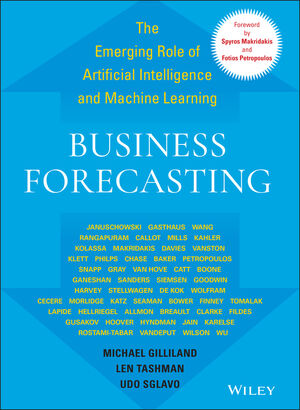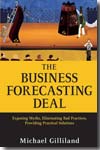Business forecasting
the emerging role of artificial intelligence and machine learning
- ISBN: 9781119782476
- Editorial: John Wiley & Sons, Inc.
- Fecha de la edición: 2021
- Lugar de la edición: Chichester. Reino Unido
- Encuadernación: Cartoné
- Medidas: 26 cm
- Nº Pág.: 414
- Idiomas: Inglés

Discover the role of machine learning and artificial intelligence in business forecasting from some of the brightest minds in the field
In Business Forecasting: The Emerging Role of Artificial Intelligence and Machine Learning accomplished authors Michael Gilliland, Len Tashman, and Udo Sglavo deliver relevant and timely insights from some of the most important and influential authors in the field of forecasting. You'll learn about the role played by machine learning and AI in the forecasting process and discover brand-new research, case studies, and thoughtful discussions covering an array of practical topics. The book offers multiple perspectives on issues like monitoring forecast performance, forecasting process, communication and accountability for forecasts, and the use of big data in forecasting.
You will find:
Discussions on deep learning in forecasting, including current trends and challenges
Explorations of neural network-based forecasting strategies
A treatment of the future of artificial intelligence in business forecasting
Analyses of forecasting methods, including modeling, selection, and monitoring
In addition to the Foreword by renowned researchers Spyros Makridakis and Fotios Petropoulos, the book also includes 16 "opinion/editorial" Afterwords by a diverse range of top academics, consultants, vendors, and industry practitioners, each providing their own unique vision of the issues, current state, and future direction of business forecasting.
Perfect for financial controllers, chief financial officers, business analysts, forecast analysts, and demand planners, Business Forecasting will also earn a place in the libraries of other executives and managers who seek a one-stop resource to help them critically assess and improve their own organization's forecasting efforts.
Chapter 1 Artificial Intelligence and Machine Learning in Forecasting 31
1.1 Deep Learning for Forecasting (Tim Januschowski and colleagues) 32
1.2 Deep Learning for Forecasting: Current Trends and Challenges (Tim Januschowski and Colleagues) 41
1.3 Neural Network--Based Forecasting Strategies (Steven Mills and Susan Kahler) 48
1.4 Will Deep and Machine Learning Solve Our Forecasting Problems? (Stephan Kolassa) 65
1.5 Forecasting the Impact of Artificial Intelligence: The Emerging and Long-Term Future (Spyros Makridakis) 72
Commentary: Spyros Makridakis's Article "Forecasting The Impact Of Artificial Intelligence" (Owen Davies) 80
1.6 Forecasting the Impact of Artificial Intelligence: Another Voice (Lawrence Vanston) 84
Commentary: Response to Lawrence Vanston (Spyros Makridakis) 92
1.7 Smarter Supply Chains through AI (Duncan Klett) 94
1.8 Continual Learning: The Next Generation of Artificial Intelligence (Daniel Philps) 103
1.9 Assisted Demand Planning Using Machine Learning (Charles Chase) 110
1.10 Maximizing Forecast Value Add through Machine Learning and Behavioral Economics (Jeff Baker) 115
1.11 The M4 Forecasting Competition -- Takeaways for the Practitioner (Michael Gilliland) 124
Commentary --The M4 Competition and a Look to the Future (Fotios Petropoulos) 132
Chapter 2 Big Data in Forecasting 135
2.1 Is Big Data the Silver Bullet for Supply-Chain Forecasting? (Shaun Snapp) 136
Commentary: Becoming Responsible Consumers of Big Data (Chris Gray) 142
Commentary: Customer versus Item Forecasting (Michael Gilliland) 146
Commentary: Big Data or Big Hype? (Stephan Kolassa) 148
Commentary: Big Data, a Big Decision (Niels van Hove) 150
Commentary: Big Data and the Internet of Things (Peter Catt) 152
2.2 How Big Data Could Challenge Planning Processes across the Supply Chain (Tonya Boone, Ram Ganeshan, and Nada Sanders) 155
Chapter 3 Forecasting Methods: Modeling, Selection, and Monitoring 163
3.1 Know Your Time Series (Stephan Kolassa and Enno Siemsen) 164
3.2 A Classification of Business Forecasting Problems (Tim Januschowski and Stephan Kolassa) 171
3.3 Judgmental Model Selection (Fotios Petropoulos) 181
Commentary: A Surprisingly Useful Role for Judgment (Paul Goodwin) 192
Commentary: Algorithmic Aversion and Judgmental Wisdom (Nigel Harvey) 194
Commentary: Model Selection in Forecasting Software (Eric Stellwagen) 195
Commentary: Exploit Information from the M4 Competition (Spyros Makridakis) 197
3.4 A Judgment on Judgment (Paul Goodwin) 198
3.5 Could These Recent Findings Improve Your Judgmental Forecasts? (Paul Goodwin) 207
3.6 A Primer on Probabilistic Demand Planning (Stefan de Kok) 211
3.7 Benefits and Challenges of Corporate Prediction Markets (Thomas Wolfram) 215
3.8 Get Your CoV On . . . (Lora Cecere) 225
3.9 Standard Deviation Is Not the Way to Measure Volatility (Steve Morlidge) 230
3.10 Monitoring Forecast Models Using Control Charts (Joe Katz) 232
3.11 Forecasting the Future of Retail Forecasting (Stephan Kolassa) 243 Commentary (Brian Seaman) 255
Chapter 4 Forecasting Performance 259
4.1 Using Error Analysis to Improve Forecast Performance (Steve Morlidge) 260
4.2 Guidelines for Selecting a Forecast Metric (Patrick Bower) 271
4.3 The Quest for a Better Forecast Error Metric: Measuring More Than the Average Error (Stefan de Kok) 277
4.4 Beware of Standard Prediction Intervals from Causal Models (Len Tashman) 290
Chapter 5 Forecasting Process: Communication, Accountability, and S&OP 297
5.1 Not Storytellers But Reporters (Steve Morlidge) 298
5.2 Why Is It So Hard to Hold Anyone Accountable for the Sales Forecast? (Chris Gray) 303
5.3 Communicating the Forecast: Providing Decision Makers with Insights (Alec Finney) 310
5.4 An S&OP Communication Plan: The Final Step in Support of Company Strategy (Niels van Hove) 317
5.5 Communicating Forecasts to the C-Suite: A Six-Step Survival Guide (Todd Tomalak) 325
5.6 How to Identify and Communicate Downturns in Your Business (Larry Lapide) 331
5.7 Common S&OP Change Management Pitfalls to Avoid (Patrick Bower) 338
5.8 Five Steps to Lean Demand Planning (John Hellriegel) 342
5.9 The Move to Defensive Business Forecasting (Michael Gilliland) 346
Afterwords: Essays on Topics in Business Forecasting 351
Observations from a Career Practitioner: Keys to Forecasting Success (Carolyn Allmon) 351
Demand Planning as a Career (Jason Breault) 354
How Did We Get Demand Planning So Wrong? (Lora Cecere) 357
Business Forecasting: Issues, Current State, and Future Direction (Simon Clarke) 358
Statistical Algorithms, Judgment and Forecasting Software Systems (Robert Fildes) 361
The <
The Future of Forecasting Is Artificial Intelligence Combined with Human Forecasters (Jim Hoover) 367
Quantile Forecasting with Ensembles and Combinations (Rob J. Hyndman) 371
Managing Demand for New Products (Chaman L. Jain) 376
Solving for the Irrational: Why Behavioral Economics Is the Next Big Idea in Demand Planning (Jonathon Karelse) 380
Business Forecasting in Developing Countries (Bahman Rostami-Tabar) 382
Do the Principles of Analytics Apply to Forecasting? (Udo Sglavo) 387
Groupthink on the Topic of AI/ML for Forecasting (Shaun Snapp) 390
Taking Demand Planning Skills to the Next Level (Nicolas Vandeput) 392
Unlock the Potential of Business Forecasting (Eric Wilson) 394
Building a Demand Plan Story for S&OP: The Business Value of Analytics (Dr. Davis Wu) 396
About the Editors 401








